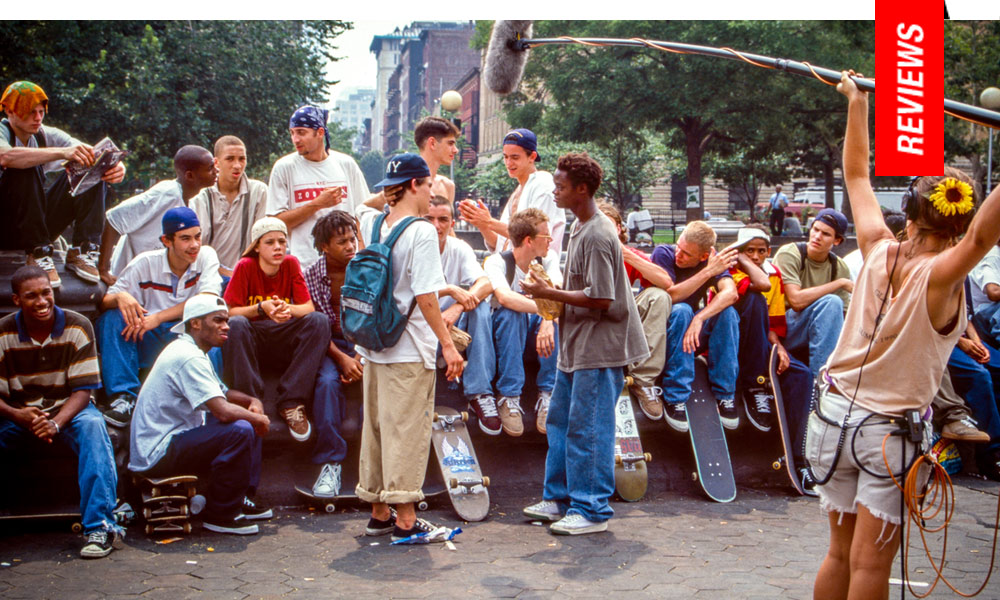The Kids Aren’t All Right: Martin Offers a Case Study on Exploitation from 90s Cult Film
It’s mind boggling to look back on the not-too-distant past to realize how certain accepted practices and procedures were as inappropriate and outrageous as something in the Wild West. The past in question here is the mid-1990s, when twenty-six odd years ago, director Larry Clark became a notorious provocateur Kids was unleashed at the 1995 Cannes Film Festival. A cultural sensation which blossomed a cult following for Clark, documentarian Eddie Martin revisits the non-professional actors cast in the film and the destructive effects the experience had on several of them.
Showcasing the reality of profiteering from a group of people while failing to establish even a fiscal reciprocity for their contributions, Eddie Martin‘s The Kids is a documentary on the nature of exploitation in an industry which has only begun to address these practices with the feeblest of lip service. It is a shameful indictment for the likes of Charles and scribe Harmony Korine, only nineteen years old at the time, both who declined to participate in the documentary.
When Clark’s directorial debut Kids was released in 1995, it was a cultural juggernaut, a wake-up call to the world, seemingly, about a group of NYC teens. The thrust of the narrative concerned Leo Fitzpatrick as Telly, who desires to deflower as many virgins as possible, opening with him having sex with a 12-year-old. One of his past sexual partners, Jenny (Chloe Sevigny) tests positive for HIV, and the film plays out as she tries to reach Telly while he winds his way around the city with friends engaged in various acts of drug abuse and sexual activity. The film ends with Jenny, passed out at a party, being raped. In the aftermath, several cast members, playing versions of themselves, attempted to spin their notoriety into a film career. The documentary follows surviving members of the production and their memories of Justin Pierce and Harold Hunter, paying homage to the dysfunction they left behind and the troubling abandonment of the filmmakers.
Martin’s approach seems to be along the lines of ‘let me just leave this here’ in several moments which should be generating ripples of conversations. Of course, Harvey Weinstein, who distributed Kids via Miramax, is a momentary blip highlighting the extensive and trenchant issues beyond Clark, but clearly Martin’s odyssey looks to specifically chart the demise of Harold Hunter and Justin Pierce, both who moved to Hollywood and pursued a film career.
The most touching part of the documentary is the clip of Pierce’s win for Best Debut Performance at the Independent Spirit Awards, nestled as it is within the context of their lives at the time. Alongside Pierce, Hunter’s speech is heartbreaking. While Pierce experienced some success in future projects before taking his life in Las Vegas in 2000, Martin provides a unique sort of catharsis by showcasing Pierce’s father, an Australian who never knew of his son’s existence. But the real conversation piece of The Kids should be Harold Hunter, whom Clark unnecessarily exploited with an infamous nude scene. The grotesqueness of the scene is enhanced by the debasement behind the scenes, where white gate keepers use black bodies for profit, and then abandon them like desiccated husks after they’re through. It is a moment of sexual fetishization never aptly called out, either because it’s not the focus or merely a footnote for the various troubling issues of filmmakers or documentarians (Kids is technically a hybrid experimental film masquerading as fiction narrative, but the blurred lines result in an uncomfortable Cannes Press Conference, where international journalists were concerned with questioning the reality of what they saw). Hunter died of a drug overdose in 2006.
The Kids arrives on the heels of Soleil Moon Frye’s personal documentary Kid 90, wherein the child star had connections with Pierce, Hunter, and their cohorts. She mourns their deaths similarly, along with other colleagues she knew from the period. If Frye’s personal doc made you curious for more, Martin fills in some necessary voids. “We were left where we started from,” is one of several comments from the original cast which leads to the notion of responsibility for the care of one’s subjects and participants. If Kids was considered a hellacious wake-up call as a portrait of youths lost to the streets like some dystopian urban version of Lord of the Flies, the story behind its origins and the abandonment of its first-time actors is another uncomfortable reality.
While Jon Abrahams lends his voice as one of the ‘outsiders’ in the cast, Rosario Dawson and Chloe Sevigny are also absent, though it’s really Clark and Korine whose statements and thought processes seem necessary. Martin’s expose is not entirely unflinching, as this presentation leaves us to our own conclusions on aspects demanding a bit more criticism. But if Clark’s film now seems a sort of prototype outlining how the detrimental fifteen-minutes-of-fame creates a problematic nexus for reality television stars unable to pivot from shock value shine to a stable career in entertainment, it highlights the continued inability to address, on a cultural level, how our consumption of stories and images often demands the destruction of said subjects.
Reviewed on June 12 at the 2021 Tribeca Film Festival. Feature Documentary. 91 Mins.
★★★½/☆☆☆☆☆
